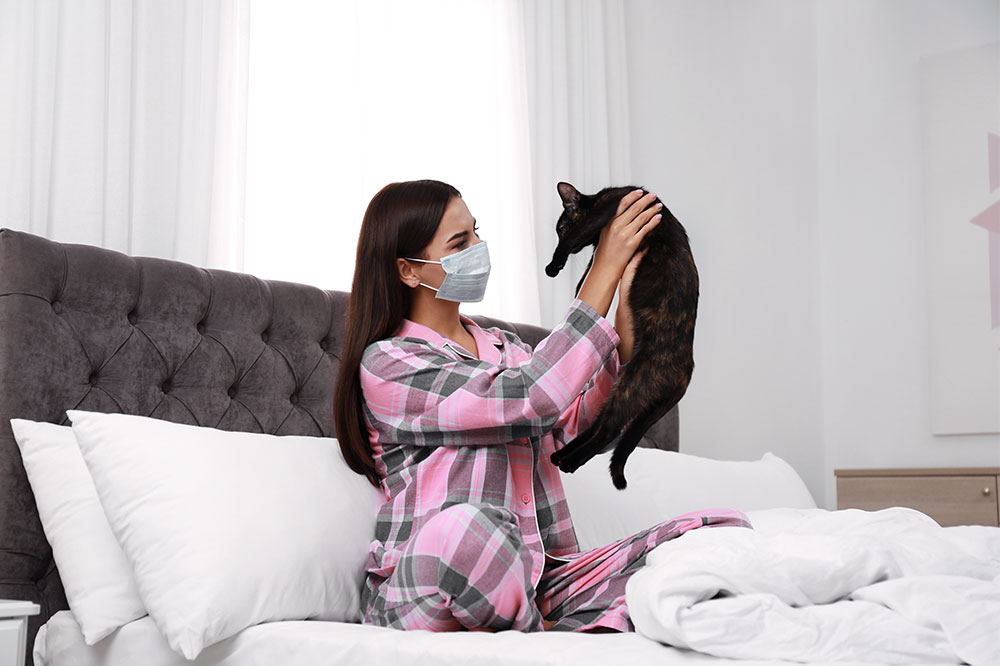
Pet allergy management – A guide for pet owners
Pet allergies are more common than you think. Be it dogs, cats, or rabbits, all of them can develop excessive immune responses to specific food and environment. These allergies manifest in numerous ways and must be treated uniquely in different animals. In this brief guide, we’ll first learn how to manage allergies in dogs, cats, and rabbits. Then, we’ll look at treatment methods common to all pets.
Managing allergies in dogs
Incessant itching is the primary sign of allergies in dogs. The itching can be localized (in one area) or generalized (affect the entire body). It’s typically followed by biting, sneezing, coughing, and discharge from the eyes and nose. Food allergens can also set off vomiting and diarrhea.
The best way to prevent environmental allergies in dogs is to keep them clean. You can use hypoallergic shampoos and give them regular baths to wash their coat. Most dogs are allergic to specific meat and grains, so make sure you watch what they eat.
How to treat allergies in cats?
When hit by allergies, cats experience itching, hair loss, redness, sneezing, vomiting, gagging, swelling, and bite their paws or tail. Swelling in the face, throat, and nose can also occur, causing breathing difficulties. This sign is worrisome, especially in cats already suffering from asthma or wheezing.
The best solution is to eliminate the allergen either from the environment or the diet. Occasionally, treatment might include long-term medication through steroids, antihistamines, or allergy therapies. Including omega-3 fatty acids and edible parts of the yucca plant in their diet can also do your cats a lot of good.
Controlling rabbit allergies
While red eyes and discharge from the rabbit’s nose could mean hay fever, allergic reactions are a more common diagnosis. Other signs to look out for are your bunny rubbing its face or touching the nose with its paws. It should be taken seriously as prolonged exposure to environmental irritants can trigger respiratory infections, bronchitis, and chronic rhinitis.
Thankfully, a simple blood test can confirm the allergy in rabbits. Vets usually prescribe anti-inflammatory medication as a first line of treatment. To prevent the problem, you can eliminate the allergen by clearing the air of dust, washing the cage, and using natural cleaning products like vinegar and baking soda.
Common medications for pet allergy treatment
Depending on the case, vets choose different lines of medication. Some options include:
- Antihistamines: Doctors usually prescribe antihistamines like Benadryl, Cyproheptadine, Zyrtec, and Doxepin for pets. You can buy them over the counter, but always consult a veterinarian for the correct dosage. However, note that rabbits, being small, can only handle small doses of mild antihistamines like Benadryl.
- Corticosteroids: These are an alternative to antihistamines. Both natural and synthetic corticosteroids are safe for dogs, but synthetic ones are preferred for their potency. Cats, however, lack certain enzymes to break down this medicine, and thus Prednisolone or Methylprednisolone must always be used to minimize side effects.
- Cyclosporine: While antihistamines and corticosteroids are preferred for instant relief, Cyclosporine is a drug used for long-term management. It’s an immune-modulatory medicine that reduces T-cell activation and cytokine production.
Allergen-specific desensitization therapy
Desensitization to the specific allergen your pet is allergic to is called allergen-specific desensitization. Here, allergens are slowly introduced into the pet’s body to reduce the reactions. Allergies to seasonal pollen respond well to such desensitization. You can treat allergies due to pollen from trees, grass, and weed, molds, feathers, dander, and mites by this method.
As per estimates, over 70 percent of pets treated through desensitization respond positively. Besides, allergy therapy is the most affordable option for long-term benefits, reducing the need for regular medication.
Shampoo treatments for pet allergies
Hypoallergenic shampoos are available from various brands like Douxo, Earthbath, and Kaytee for dogs, cats, and rabbits. Apart from anti-fungal and antibacterial properties, these medicated shampoos also help reduce inflammation and irritation. Speak to your veterinary dermatologist to choose the right brand for your pet.



